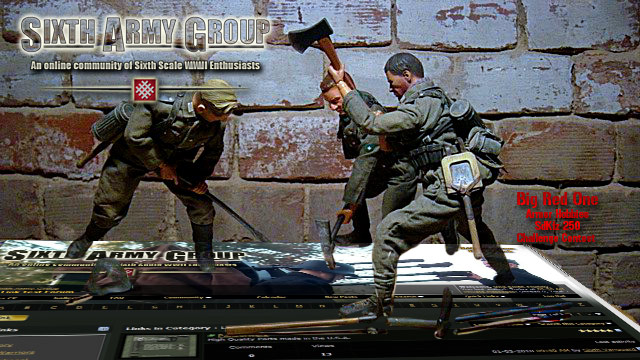The 25 Pounder AT 3.7"......The other 88mm.
As part of 21st Army Group, the 3rd Canadian Infantry Division pushes further into Holland, we are to take the Scheldt peninsula and islands to the north of the estuary. After crossing the Bathse and Scheldt Canals the 14th Field Regiment is deployed in support of 3rd Division's push towards Oostdijk, the 12th and 13th Regiments are to the northeast on our right flank. The weather is terrible, with constant rain and mud that is hindering all movement except tracked vehicles. The Germans have also opened the dykes to the north and flooded the area, movement is now only possible on the elevated roads in direct sight of the enemy.
The 81st Field Battery of the 14th has deployed their gun and been surveyed, ours was first onto the grid and thus receives the honour of ranging for the battery. A round is lobbed 8700 yards into Rilland and is corrected by the Forward Obsevation Officer through the Divisional Command Post who relay any corrections and another round is propelled towards the target. With the range corrected the other 23 guns of the regiment zero in on the target and prepare to walk a barrage into the town in support of a planned attack this afternoon by the 3rd Division.
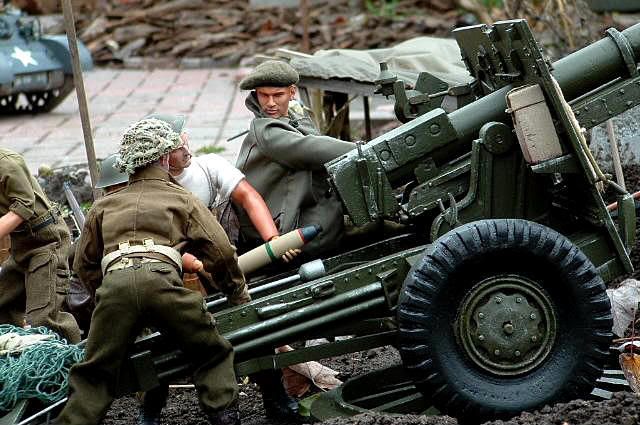
As H Hour approaches and the regiments guns are ready. Our orders call for 100 rounds over the next half hour; roughly 4 rounds a minute, a liesurely pace indeed. The lads don't mind, as we'll have plenty of business over the next couple of weeks if the Germans offer the expected resistance to our endeavors. Any counter attacks will be turned back by the massed guns of the whole division if necessary. The Survey Regiment has located all the guns of the division on the grid; allowing as massive amount of artillery to be directed at any trouble that materializes.
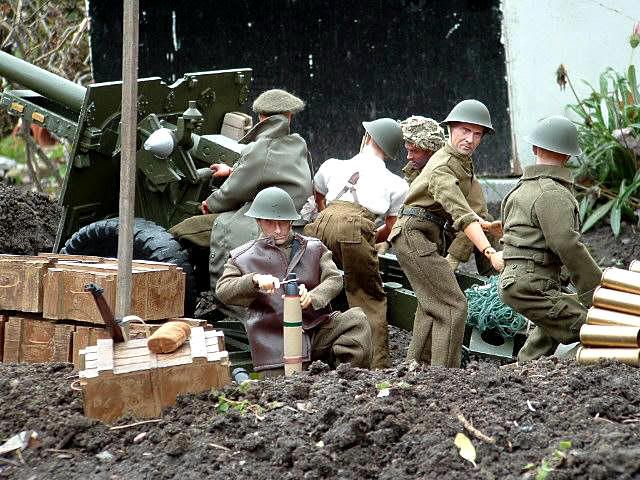
The guns of the Division open up at the designated hour and a cresendo of doom descends on the German defenders of Rilland. All seventy-two 25 Pounders of the division proceed too deliver 7200 rounds on the town's defenses.. As the barrage advances a rain of death and destruction will be visited on the enemy and his embattlements. Hopefully the infantry and armour will be able to secure the area with a minimum of difficulty.
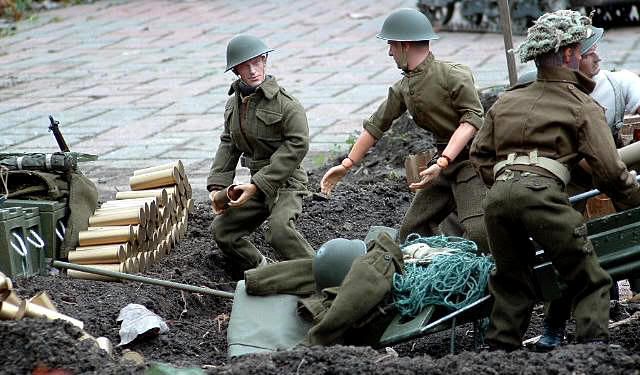
The shells, propelled by their accompanying cartridges are sent on their way and things settle into a routine. A rythem develops, everyone is straining and no one complains of the cold and damp. The piles of ammo begins to diminish and is replaced by an ever growing pile of spent casings.
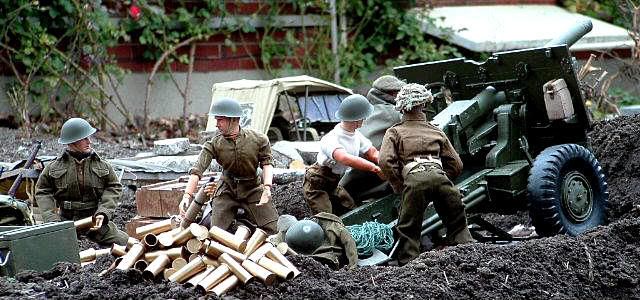
Another fuse is set for airburst and passed along the line to the awaiting breech which will deliver it to the enemy "No Charge" courtesy of the the 1st Canadian Army.
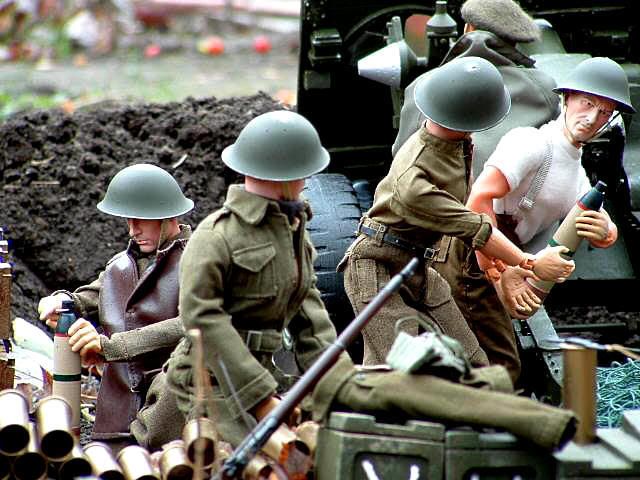
As the shelling reaches it's apex, someone pipes up that dinner is almost ready and now would be a good time to devour that roasting chicken that's has been tickling our noses for the last couple of hours.
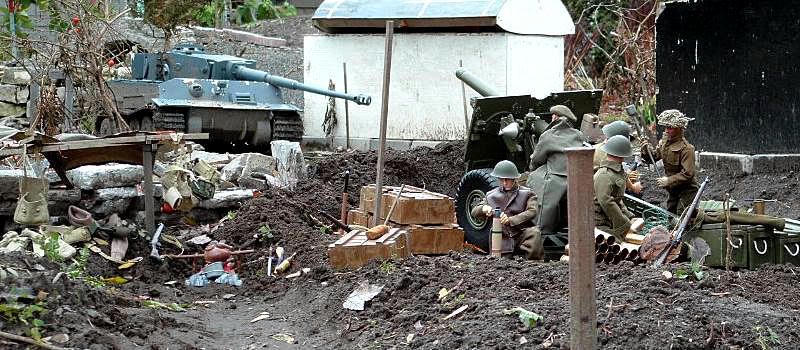
The corporal agrees that this would be a excellent idea, but first another fifty rounds should be prepared for the inevitable German counterattack and the spent casings need to be tossed to clear the area. Then we'll rest easy for dinner. Assuming we're not assigned any further fire missions by the CP in the interum.
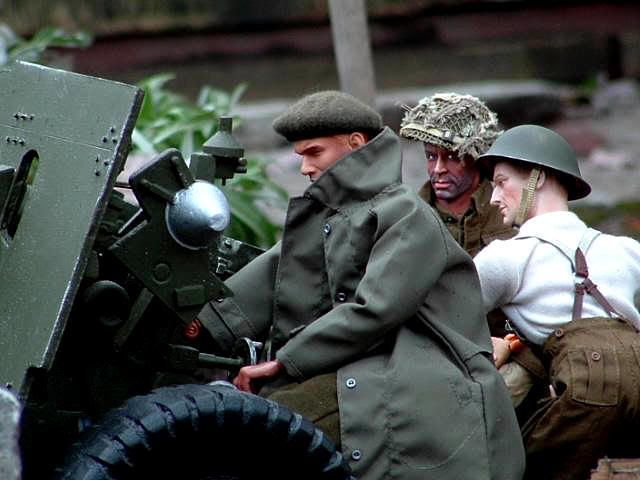
The last round is rammed into the breech and prepared for it's journey to the enemy, with a deafening roar it's sent on it's way and no more rounds will be loaded until the breech and barrel cool to prevent an unplanned detonation.
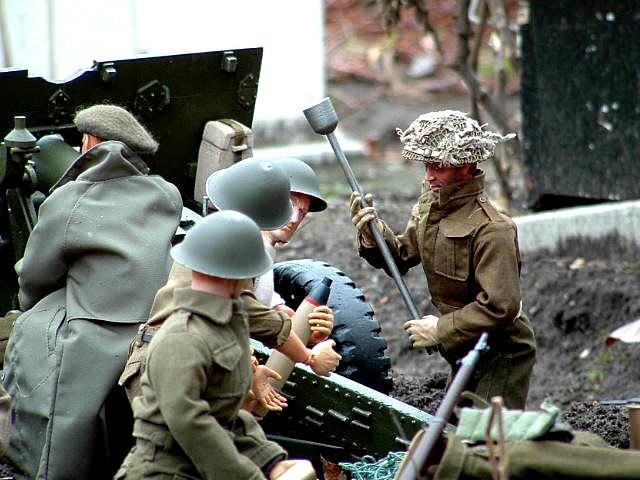
The lads will take a few moments to gorge on their awaiting feast, yet they'll always be available to support our infantry and tanks as they take the fight to the enemy.
From the reports trickling in it appears that this Scheldt operation is going to be long and tedious.
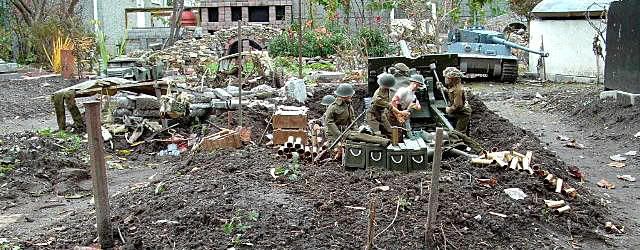
As part of 21st Army Group, the 3rd Canadian Infantry Division pushes further into Holland, we are to take the Scheldt peninsula and islands to the north of the estuary. After crossing the Bathse and Scheldt Canals the 14th Field Regiment is deployed in support of 3rd Division's push towards Oostdijk, the 12th and 13th Regiments are to the northeast on our right flank. The weather is terrible, with constant rain and mud that is hindering all movement except tracked vehicles. The Germans have also opened the dykes to the north and flooded the area, movement is now only possible on the elevated roads in direct sight of the enemy.
The 81st Field Battery of the 14th has deployed their gun and been surveyed, ours was first onto the grid and thus receives the honour of ranging for the battery. A round is lobbed 8700 yards into Rilland and is corrected by the Forward Obsevation Officer through the Divisional Command Post who relay any corrections and another round is propelled towards the target. With the range corrected the other 23 guns of the regiment zero in on the target and prepare to walk a barrage into the town in support of a planned attack this afternoon by the 3rd Division.

As H Hour approaches and the regiments guns are ready. Our orders call for 100 rounds over the next half hour; roughly 4 rounds a minute, a liesurely pace indeed. The lads don't mind, as we'll have plenty of business over the next couple of weeks if the Germans offer the expected resistance to our endeavors. Any counter attacks will be turned back by the massed guns of the whole division if necessary. The Survey Regiment has located all the guns of the division on the grid; allowing as massive amount of artillery to be directed at any trouble that materializes.

The guns of the Division open up at the designated hour and a cresendo of doom descends on the German defenders of Rilland. All seventy-two 25 Pounders of the division proceed too deliver 7200 rounds on the town's defenses.. As the barrage advances a rain of death and destruction will be visited on the enemy and his embattlements. Hopefully the infantry and armour will be able to secure the area with a minimum of difficulty.

The shells, propelled by their accompanying cartridges are sent on their way and things settle into a routine. A rythem develops, everyone is straining and no one complains of the cold and damp. The piles of ammo begins to diminish and is replaced by an ever growing pile of spent casings.

Another fuse is set for airburst and passed along the line to the awaiting breech which will deliver it to the enemy "No Charge" courtesy of the the 1st Canadian Army.

As the shelling reaches it's apex, someone pipes up that dinner is almost ready and now would be a good time to devour that roasting chicken that's has been tickling our noses for the last couple of hours.

The corporal agrees that this would be a excellent idea, but first another fifty rounds should be prepared for the inevitable German counterattack and the spent casings need to be tossed to clear the area. Then we'll rest easy for dinner. Assuming we're not assigned any further fire missions by the CP in the interum.

The last round is rammed into the breech and prepared for it's journey to the enemy, with a deafening roar it's sent on it's way and no more rounds will be loaded until the breech and barrel cool to prevent an unplanned detonation.

The lads will take a few moments to gorge on their awaiting feast, yet they'll always be available to support our infantry and tanks as they take the fight to the enemy.
From the reports trickling in it appears that this Scheldt operation is going to be long and tedious.

